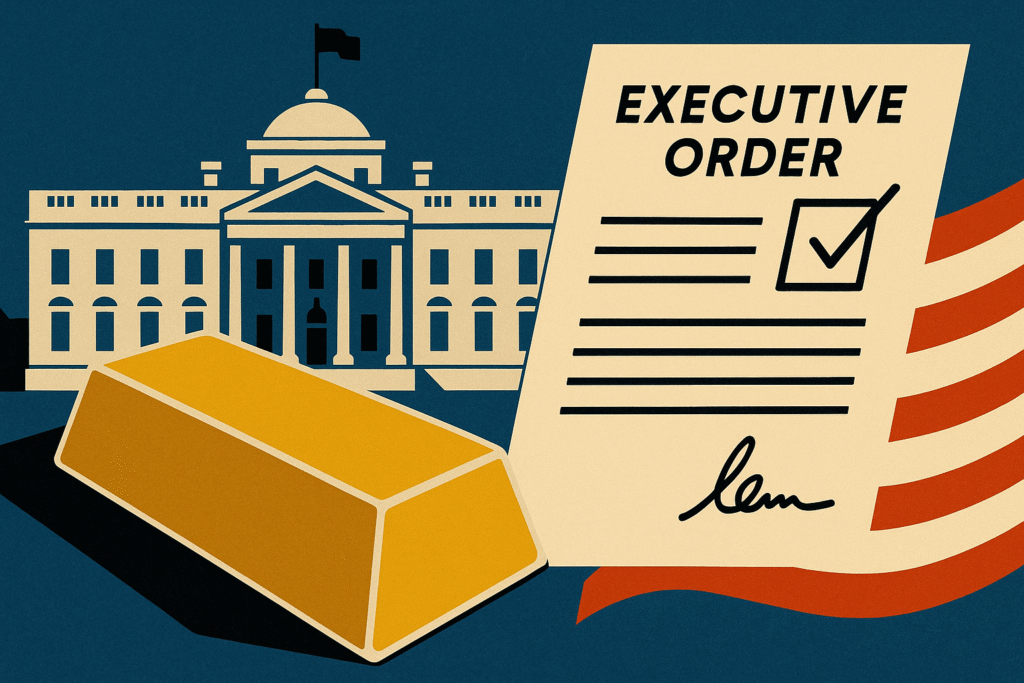The White House has announced plans to issue an executive order clarifying the U.S. government’s position on tariffs affecting gold bars, following a regulatory decision that has unsettled the global bullion market and sparked confusion among traders.
The clarification comes in response to a recent ruling by U.S. Customs and Border Protection (CBP), which stated that one-kilo and 100-ounce gold bars—two of the most commonly traded formats—should be classified under a customs code that makes them subject to import tariffs. This contradicts a previous April 2025 White House statement that explicitly exempted gold bullion from tariffs imposed under President Donald Trump’s renewed trade policy.
A White House official confirmed on Friday:
“The White House intends to issue an executive order in the near future clarifying misinformation about the tariffing of gold bars and other specialty products.”
Market Reaction and Industry Concerns
News of the ruling caused a stir in global markets. Gold futures for December delivery dropped by 1% to $3,460 per troy ounce after the Financial Times reported the planned executive clarification. This followed a sharp rise in gold prices earlier in the week, driven by fears that the U.S. had blindsided the market with a new and unexpected tariff.
The London Bullion Market Association (LBMA), representing institutional gold traders and bullion banks, said it was urgently “seeking clarification” from U.S. authorities. The U.S. Comex exchange, one of the world’s largest venues for gold trading, relies heavily on access to physical gold flows—much of which are centered in London. Market participants warn that new tariffs could disrupt these crucial cross-border flows.
The Swiss precious metals sector, which plays a central role in global gold refining, also expressed concern. The Swiss Association of Manufacturers and Traders in Precious Metals warned on Friday that the ruling would “negatively impact” global gold trade logistics and efficiency.
Administrative Contradiction or Error?
The CBP ruling was issued in response to an inquiry by a Swiss gold refiner, but many in the industry suspect it may be an administrative oversight. One executive commented,
“The U.S. has to decide if the White House was wrong in April, or if the CBP is wrong now.”
Switzerland, as the world’s leading refining hub, stands to be disproportionately affected by tariffs on gold exports to the United States.
Broader Trade War Context
The confusion over gold bars comes amid President Trump’s aggressive reactivation of his global trade war, reimposing reciprocal tariffs on nearly all major U.S. trading partners. This move has sent U.S. import duties to their highest levels in decades, impacting a wide range of goods and industries.
Nonetheless, the administration has granted numerous exemptions, including for products such as pharmaceuticals, semiconductors, and consumer electronics like smartphones, laptops, and headphones. Trump has also hinted at exemptions for companies such as Apple, which have pledged significant investment in domestic manufacturing.
However, the rapid succession of executive orders on trade has created widespread uncertainty, with businesses struggling to determine which products are subject to tariffs and which are not.
The forthcoming executive order on gold is expected to clarify the U.S. government’s intent and reduce market volatility, particularly for international traders and financial institutions relying on stable and predictable access to bullion markets.



